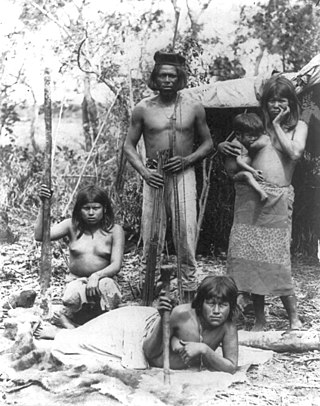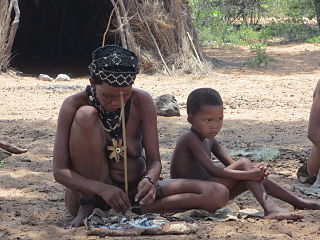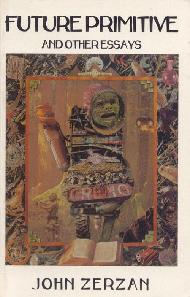Related Research Articles

A society is a group of individuals involved in persistent social interaction or a large social group sharing the same spatial or social territory, typically subject to the same political authority and dominant cultural expectations. Societies are characterized by patterns of relationships between individuals who share a distinctive culture and institutions; a given society may be described as the sum total of such relationships among its constituent members.

Personal life is the course or state of an individual's life, especially when viewed as the sum of personal choices contributing to one's personal identity.

A hunter-gatherer or forager is a human living in a community, or according to an ancestrally derived lifestyle, in which most or all food is obtained by foraging, that is, by gathering food from local naturally occurring sources, especially wild edible plants but also insects, fungi, honey, bird eggs, or anything safe to eat, and/or by hunting game. This is a common practice among most vertebrates that are omnivores. Hunter-gatherer societies stand in contrast to the more sedentary agricultural societies, which rely mainly on cultivating crops and raising domesticated animals for food production, although the boundaries between the two ways of living are not completely distinct.

Marshall David Sahlins was an American cultural anthropologist best known for his ethnographic work in the Pacific and for his contributions to anthropological theory. He was the Charles F. Grey Distinguished Service Professor Emeritus of Anthropology and of Social Sciences at the University of Chicago.

The San peoples, or Bushmen, are the members of any of the indigenous hunter-gatherer cultures of southern Africa, and the oldest surviving cultures of the region. Their recent ancestral territories span Botswana, Namibia, Angola, Zambia, Zimbabwe, Lesotho, and South Africa.

Laziness is emotional disinclination to activity or exertion despite having the ability to act or to exert oneself. It is often used as a pejorative; terms for a person seen to be lazy include "couch potato", "slacker", and "bludger". Related concepts include sloth, a Christian sin, abulia, a medical term for reduced motivation, and lethargy, a state of lacking energy.
A subsistence economy is an economy directed to basic subsistence rather than to the market.

The ǃKung are one of the San peoples who live mostly on the western edge of the Kalahari desert, Ovamboland, and Botswana. The names ǃKung (ǃXun) and Ju are variant words for 'people', preferred by different ǃKung groups. This band level society used traditional methods of hunting and gathering for subsistence up until the 1970s. Today, the great majority of ǃKung people live in the villages of Bantu pastoralists and European ranchers.

The Yaruro people are a Circum-Caribbean indigenous people, native to the ecoregion of Llanos in Venezuela, located west of the Orinoco River. The Pumé people are divided into two subgroups: The River Pumé, living along major river drainages of the Orinoco River, and the more nomadic Savanna Pumé that reside on the Llanos.
Richard Borshay Lee is a Canadian anthropologist. Lee has studied at the University of Toronto and University of California, Berkeley, where he received a Ph.D. He holds a position at the University of Toronto as Professor Emeritus of Anthropology. Lee researches issues concerning the indigenous people of Botswana and Namibia, particularly their ecology and history.

The Affluent Society is a 1958 book by Harvard economist John Kenneth Galbraith. The book sought to clearly outline the manner in which the post–World War II United States was becoming wealthy in the private sector but remained poor in the public sector, lacking social and physical infrastructure, and perpetuating income disparities. The book sparked much public discussion at the time. It is also credited with popularizing the term "conventional wisdom". Many of the ideas presented were later expanded and refined in Galbraith's 1967 book, The New Industrial State.

Future Primitive and Other Essays is a collection of essays by anarcho-primitivist philosopher John Zerzan published by Autonomedia in 1994. The book became the subject of increasing interest after Zerzan and his beliefs rose to fame in the aftermath of the trial of fellow thinker Theodore Kaczynski and the 1999 anti-WTO protests in Seattle. It was republished in 1996 by Semiotext(e), and has since been translated into French (1998), Turkish (2000), Spanish (2001), and Catalan (2002). As is the case with Zerzan's previous collection of essays, Elements of Refusal, Future Primitive is regarded by Anarcho-Primitivists and technophobes as an underground classic.
Man the Hunter was a 1966 symposium organized by Richard Lee and Irven DeVore. The symposium resulted in a book of the same title and attempted to bring together for the first time a comprehensive look at recent ethnographic research on hunter-gatherers.
Sexual division of labour (SDL) is the delegation of different tasks between the male and female members of a species. Among human hunter-gatherer societies, males and females are responsible for the acquisition of different types of foods and shared them with each other for a mutual or familial benefit. In some species, males and females eat slightly different foods, while in other species, males and females will routinely share food; but only in humans are these two attributes combined. The few remaining hunter-gatherer populations in the world serve as evolutionary models that can help explain the origin of the sexual division of labour. Many studies on the sexual division of labour have been conducted on hunter-gatherer populations, such as the Hadza, a hunter-gatherer population of Tanzania. In modern day society, sex differences in occupation is seen across cultures, with the tendency that men do technical work and women tend to do work related to care.
Political economy in anthropology is the application of the theories and methods of historical materialism to the traditional concerns of anthropology, including but not limited to non-capitalist societies. Political economy introduced questions of history and colonialism to ahistorical anthropological theories of social structure and culture. Most anthropologists moved away from modes of production analysis typical of structural Marxism, and focused instead on the complex historical relations of class, culture and hegemony in regions undergoing complex colonial and capitalist transitions in the emerging world system.
Primitive communism is an attempt to describe the gift economies of hunter-gatherers throughout history, where resources and property hunted or gathered are shared within the group as communism. In political sociology and anthropology, it is also a concept, that describes hunter-gatherer societies as traditionally being based on egalitarian social relations and common ownership. A primary inspiration for both Marx and Engels were Lewis H. Morgan's descriptions of "communism in living" as practised by the Haudenosaunee of North America. In Marx's model of socioeconomic structures, societies with primitive communism had no hierarchical social class structures or capital accumulation.
The Kalahari Debate is a series of back and forth arguments that began in the 1980s amongst anthropologists, archaeologists, and historians about how the San people and hunter-gatherer societies in southern Africa have lived in the past. On one side of the debate were scholars led by Richard Borshay Lee and Irven DeVore, considered traditionalists or "isolationists." On the other side of the debate were scholars led by Edwin Wilmsen and James Denbow, considered revisionists or "integrationists."
Pauline Wiessner is an American anthropologist who focused on cultural anthropology. She is currently a professor at University of Utah. Wiessner has held various professor positions at Universities in the United States, Denmark, and France and various positions in Universities and communities across the world. During her research she work with Ju/’hoansi Bushmen of the Kalahari in South Africa to learn about the social networks and Enga of Papua New Guinea to learn about their customs of exchange, ritual and warfare.
A subsistence pattern – alternatively known as a subsistence strategy – is the means by which a society satisfies its basic needs for survival. This encompasses the attainment of nutrition, water, and shelter. The five broad categories of subsistence patterns are foraging, horticulture, pastoralism, agriculture, and industrial food production.
Nurit Bird-David is a professor of cultural anthropology at the University of Haifa, Israel. She is best known for her study of the Nayaka hunter-gatherers in South India, upon which she based much of her writings on animism, relational epistemology, and indigenous small-scale communities, and which later inspired additional fieldwork and insights on home-making in contemporary industrial societies, and the theoretical concept of scale in anthropology and other social sciences.
References
- ↑ Sahlins, Marshall (2017). Stone Age Economics. Routledge. p. 2. ISBN 9781138702615.
- 1 2 Barnard, Alan (1983). "Contemporary Hunter-Gatherers: Current Theoretical Issues in Ecology and Social Organization". Annual Review of Anthropology. 12: 193–214. doi:10.1146/annurev.an.12.100183.001205. JSTOR 2155646.
- 1 2 Sahlins, M. (1968). "Notes on the Original Affluent Society", Man the Hunter. R.B. Lee and I. DeVore (New York: Aldine Publishing Company) pp. 85-89. ISBN 020233032X
- 1 2 3 4 5 Sahlins, M. (2005). The Original Affluent Society Archived 2019-07-24 at the Wayback Machine [Online] in M. Sahlins, Stone Age Economics
- ↑ Lee, Richard B. (1965). Subsistence Ecology of ǃKung Bushmen (PhD). University of California, Berkeley.
- ↑ Lee, Richard B. (1979). The ǃKung San: Men, Women and Work in a Foraging Society. Cambridge and New York: Cambridge University Press. ISBN 0-521-29561-0.
- ↑ "The Original Affluent Society--Marshall Sahlins". www.primitivism.com. Archived from the original on 2019-10-01. Retrieved 2015-07-29.
- ↑ Sahlins, Marshall (2009). "Hunter-gatherers: insights from a golden affluent age" (PDF). Pacific Ecologist. 18: 3–8. Archived from the original (PDF) on 2015-03-18. Retrieved 2015-07-29.
- ↑ Lawrence H. Keeley (1996). War Before Civilization: The Myth of the Peaceful Savage. Oxford University Press. p. 272. ISBN 9780195119121.
- ↑ "Hunter-gatherer mortality". 28 February 2007.
- ↑ Kaplan, David (2000). "The Darker Side of the Original Affluent Society" (PDF). Journal of Anthropological Research. 56 (3): 301–324. doi:10.1086/jar.56.3.3631086. JSTOR 3631086. S2CID 140333399.